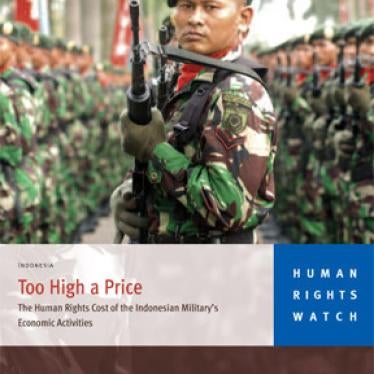(Jakarta) - The Indonesian government should end military ownership of businesses without further delay, Human Rights Watch said today as it launched the 159-page Indonesian translation of a study on military self-financing in Indonesia.
“Too High a Price: The Human Rights Cost of the Indonesian Military’s Economic Activities” was published in English in June 2006, and is based on research conducted from 2004 to 2006. It describes the Indonesian military’s longstanding practice of independently financing itself and presents an “anatomy” of its scattered business interests. The report also documents several examples of the Indonesian military’s involvement in business and its harmful effect on civilians. It outlines recommendations for needed reform, in keeping with a legal requirement for the government to take over military businesses.
“When ‘Too High a Price’ was released, several senior Indonesian officials agreed that military involvement in the economy undermines civilian control and fuels human rights abuses, crime, and corruption,” said Lisa Misol, senior researcher in the Business and Human Rights Program at Human Rights Watch and author of the report. “But they’ve done almost nothing about it.”
A 2004 law bans commercial activities by the military and requires the Indonesian government to take over all military businesses by 2009. The government of President Susilo Bambang Yudhoyono has said it intends to follow the law and put an end to military business, but the inter-agency team named to plan the takeover of military-owned companies has accomplished little since it was formed in 2005.
The government first promised to issue a presidential decree with implementing regulations by early November 2005, only to push the target date back to April 2006 and then to August 2006. Recent statements by Indonesian officials suggest that further delays are expected.
On February 7, Lt. Gen. Sjafrie Sjamsoeddin, secretary-general of the Ministry of Defense, announced that a draft presidential decree was awaiting approval. But Cabinet Secretary Sudi Silalahi responded two days later by announcing that that the president's office had returned the draft for unspecified improvements. It was unclear when a new draft would be ready.
“Parliament gave a five-year deadline to end military self-financing and now we’ve reached the half-way point,” said Misol. “But the government has made no substantial progress: it hasn’t even produced the official decree needed to implement the law. It looks like the government is just stalling for time and hoping everyone will forget about the 2004 law.”
Human Rights Watch called on President Yudhoyono to exercise leadership to advance military reform, which is widely viewed as fundamental for strengthening democratic institutions and protecting human rights.
Human Rights Watch also called on countries with close ties to the Indonesian government and military, including the United States and Australia, to press the Indonesian government to act swiftly on military reform.
“The Indonesian government should be moving urgently to assert formal control over military business, and President Yudhoyono should push it in that direction,” Misol said. “Unless Jakarta makes serious moves to end military self-financing, the sincerity of its military reform policy will be called into question, at home and abroad.”
For a February 2007 update on reform of military business in Indonesia, please click.







